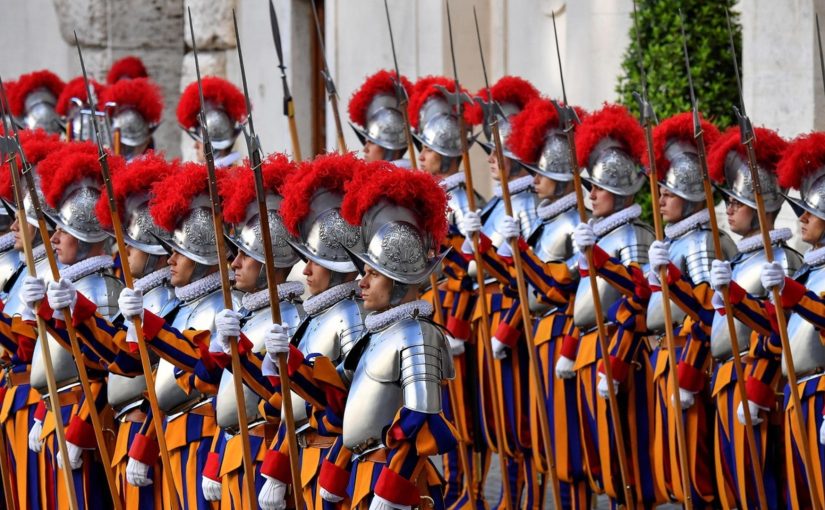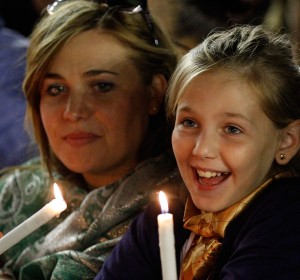I was sent this link of a French documentary on the Swiss Guard. Even if you don’t understand French, even a little bit, watching the documentary is rewarding for the images alone. It’s brief, nearly 32 min.
Category: Holy See
Papal train inaugurated from Vatican City
 Beginning today you can take the new papal train from the Vatican City State to the Pontifical Villas at Castel Gandolfo just south of Rome.
Beginning today you can take the new papal train from the Vatican City State to the Pontifical Villas at Castel Gandolfo just south of Rome.
The service is offered by the Vatican Museums and available only on Saturdays for 40 euros per round trip.
A “Full Day in the Vatican” is Vatican train service bringing guests to places not frequently seen until now; the Vatican Museums organize the excursion and offer audio-guides in Italian, English, and Spanish. Check with the Vatican Museum.
Pope Francis prays for a listening heart fixed on Christ’s gaze
The evening falls on our assembly.
It is the hour in which one willingly returns home to the same meal, in the thick of affections, of the good that has been done and received, of the encounters which warm the heart and make it grow, good wine which anticipates in the days of man the feast without end.
It is also the most weighty hour for he who finds himself face to face with his own loneliness, in the bitter twilight of broken dreams and plans: how many people trudge through the day in the blind alley of resignation, abandonment, even resentment: in how many homes was the wine of joy less plenty, therefore, the zest – and the wisdom – of life. For one another we make our prayer heard.
It is significant how – even in the individualistic culture which distorts and renders connections fleeting – in each person born of a woman, there remains alive an essential need of stability, of an open door, of someone with whom to weave and to share the story of life, a history to which to belong.
The communion of life assumed by spouses, their openness to the gift of life, the mutual protection, the encounter and the memory of generations, educational support, the transmission of the Christian faith to their children . . . With all this, the family continues to be a school without parallel of humanity, an indispensable contribution to a just and united society. (cfr Esort. ap. Evangelii gaudium, 66-68).
And the deeper its roots, the more it is possible in life to leave and to go far, without getting lost or feeling out of place in foreign lands.
This horizon helps us to grasp the importance of the Synodal assembly, which opens tomorrow.
Already, the “convenire in unum” surrounding the Bishop of Rome is an event of grace, in which episcopal collegiality is made manifest in a path of spiritual and pastoral discernment.
To search for that which today the Lord asks of His Church, we must lend our ears to the beat of this time and perceive the “scent” of the people today, so as to remain permeated with their joys and hopes, by their sadness and distress, at which time we will know how to propose the good news of the family with credibility.
We know, in fact, as in the Gospel, there is a strength and tenderness capable of defeating that which is created by unhappiness and violence.
Yes, in the Gospel there is salvation which fulfills the most profound needs of man! Of this salvation – work of God’s mercy and grace – as a Church, we are sign and instrument, a living and effective sacrament.
If it were not so, our building would remain only a house of cards, and pastors would be reduced to clerics of state, on whose lips the people would search in vain for the freshness and “smell of the Gospel.” (Ibid., 39).
Thus emerges also the subject of our prayer.
Above all, we ask the Holy Spirit, for the gift of listening for the Synod Fathers: to listen in the manner of God, so that they may hear, with him, the cry of the people; to listen to the people, until they breathe the will to which God calls us.
Besides listening, we invoke an openness toward a sincere discussion, open and fraternal, which leads us to carry with pastoral responsibility the questions that this change in epoch brings.
We let it flow back into our hearts, without ever losing peace, but with serene trust which in his own time the Lord will not fail to bring into unity.
Does not Church history perhaps recount many similar situations, which our Fathers knew how to overcome with persistent patience and creativity?
The secret lies in a gaze: and it is the third gift that we implore with our prayer. Because, if we truly intend to walk among contemporary challenges, the decisive condition is to maintain a fixed gaze on Jesus Christ – Lumen Gentium – to pause in contemplation and in adoration of His Face.
If we assume his way of thinking, of living and of relating, we will never tire of translating the Synodal work into guidelines and paths for the pastoral care of the person and of the family.
In fact, every time we return to the source of Christian experience, new paths and un-thought of possibilities open up. This is what the Gospel hints at: “Do whatever he tells you.”
These are the words which contain the spiritual testament of Mary, “the friend who is ever-concerned that wine not be lacking in our lives” (EV 286). Let us make these words ours!
At that point, our listening and our discussion on the family, loved with the gaze of Christ, will become a providential occasion with which to renew – according to the example of Saint Francis – the Church and society.
With the joy of the Gospel we will rediscover the way of a reconciled and merciful Church, poor and friend of the poor; a Church “given strength that it might, in patience and in love, overcome its sorrows and its challenges, both within itself and from without.” (Lumen Gentium, 8)
May the Wind of Pentecost blow upon the Synod’s work, on the Church, and on all of humanity. Undo the knots which prevent people from encountering one another, heal the wounds that bleed, rekindle hope.
Grant us this creative charity which consents to love as Jesus loved. And our message may reclaim the vivacity and enthusiasm of the first missionaries of the Gospel.
Cardinal Coccopalmerio speaks about marriage, communion to divorced and remarried
 Cardinal Francesco Coccopalmerio was chosen by Pope Francis to head a new commission for the study simplifying of the annulment process. The Cardinal is the President of the Pontifical Council for Legislative Texts; he spoke with Salvatore Cernuzio of ZENIT and the text of the interview was released on ZENIT on October 3, 2014.
Cardinal Francesco Coccopalmerio was chosen by Pope Francis to head a new commission for the study simplifying of the annulment process. The Cardinal is the President of the Pontifical Council for Legislative Texts; he spoke with Salvatore Cernuzio of ZENIT and the text of the interview was released on ZENIT on October 3, 2014.
The Extraordinary Synod of Bishops begins tomorrow but tonight in Rome there is a vigil service presided over by the Pope and a packed St Peter’s Square. He set the tone of wanting the Church at her various levels oriented toward the Lord in prayer.
The interview is not terrifically insightful or revealing of “possible” changes to our pastoral practice with regard to marriage and family life, or about giving a new theological anthropology, but it is a text that ought to garner some attention not only for experts but for those who work in pastoral contexts like the parish and universities. It follows:
ZENIT: The Synod is already at our door. With what state of mind do you approach this great Assembly? What are your hopes, but also your fears?
Cardinal Coccopalmerio: There is, certainly, some concern because we will be addressing delicate questions, on which opinions are diverse. The fear, which is justified, is that there will be some reason for opposition. However, I believe that, if each one of us says freely and sincerely what he thinks and others listen to him with patience and with the desire to compare and reflect further, all will be well. In this connection, I trust in the help of the Holy Spirit, that He may illumine our minds and, above all, make us open to one another.
ZENIT: The international media has given much attention to the subject of the Sacraments for civilly remarried divorced persons, theorizing in fact that there will be “clashes” and angry debates during the Assembly between conservative and progressive factions. What do you think?
Cardinal Coccopalmerio: I think the subject of Communion for remarried divorced persons is important, because there are persons who live experiences of suffering and, therefore, expect a word of light and comfort from the Church. However, obviously, this isn’t the only topic: there are many others that, perhaps, are more important. The real topic, the main one, is to make the beauty of marriage and the family understood, despite the fact that such an adventure also entails effort. If the Synod succeeds in giving, especially to young people, a more beautiful, more enthusiastic sense of marriage and the family, it will certainly have achieved the most important result. Then as well, of course, it will have to address “burning” issues, but it will do so in a wider and more serene atmosphere.
ZENIT: In regard to these burning issues, how do you define them? What is your position? In which of the two “factions,” if we can so describe them, are you?
Cardinal Cocopalmerio: I cannot anticipate here my intervention in the Synod. I only think that, following the Lord’s Gospel and it being a question of so many persons living in painful situations, we are called to commit ourselves to give satisfying and adequate answers to the needs of today.
ZENIT: Among the topics connected to the Synod are also the juridical and canonical implications of the matrimonial bond. In fact last week Pope Francis instituted a study commission for the annulments process, and made you a member. Should we describe this as a strategic move of the Pontiff on the eve of the Synod?
Cardinal Coccopalmerio: I would rather say an intelligent move that put to the fore one of the questions that the Synodal Assembly will certainly be working on. From many sides it has been suggested that the procedures be simplified to come to the declaration of an eventual matrimonial nullity. Hence this Commission works outside of the Synod but also in service of the Synod, being able to give it a notable contribution. The Pope did well in instituting it.
ZENIT: Isn’t there the risk that with a simplification of the procedures of matrimonial nullity the evangelical principle of the indissolubility of the Sacrament will be questioned?
Cardinal Coccopalmerio: The procedure for the declaration of matrimonial nullity serves to declare if a marriage is valid or not. Therefore, it isn’t a procedure for the annulment of the matrimonial bond but it serves simply to see, to confirm, to take into account the validity or invalidity of the bond. If the bond is not valid, there is the pronouncement of the nullity of the marriage; if it is valid, its existence is confirmed. It is, therefore, a procedure oriented to seeking the truth: does this bond exist or not?
The procedure for the declaration of matrimonial nullity does not put in question the principle of the indissolubility of marriage: it tends only to examine if in a concrete case, there is or is not a marriage. If the bond was never born, it is no longer about dissolubility or non-dissolubility, but about the non-existence of matrimony. Therefore, even if the procedure is simplified, it must never fail, however, in the finality of establishing the reality. And if the simplification impedes coming to knowledge of the reality it would not be good.
ZENIT: On the practical plane, there is an increase in requests for nullity. Almost 50,000 marriages in the world celebrated in church have been annulled, of which more than 2,400 alone were in Italy. Will it be possible, with this Commission, to meet these requests?
Cardinal Coccopalmerio: I don’t have the statistics, therefore I cannot know how to reply. However it seems to me that the current language is erroneous: marriages are not “annulled.” What is declared is only that the bond does not exist because it was never born, in as much as at the moment of the celebration an essential requisite was lacking, as happens, for instance, when one who marries excludes the indissolubility of marriage.
ZENIT: In the Instrumentum laboris of the synod, one reads that the Assembly will study a more valid pre-matrimonial pastoral ministry but also a strategy to support young couples after the Sacrament. In your opinion, up to now has this type of ministry been a lacuna in the Church?
Cardinal Coccopalmerio: The pastoral intention is very important. The preparation for marriage should be carried out with passion and diligence so that the future spouses are supported in a conscious and joyful way. Perhaps in some parts of the world this ambit is not taken care of or not sufficiently taken care of. I am certain that the Synod will insist on this point and will be able to renew methods and structures. Even more important, then, is post-matrimony, the follow-up, that is, the new couples that have met, for instance, with difficulties in their matrimonial life which they didn’t have as engaged couples. It is necessary to support couples, especially in their difficult moments in which there are disillusions, relational difficulties caused, for instance, by reasons of work or health.
ZENIT: I would like to hear your thought on unions between persons of the same sex. On other occasions, you have stated that homosexuals are not condemned and, if there are also stable unions between them, what is important is that they not be confused with the family and with matrimony. Can you clarify this concept?
Cardinal Coccopalmerio: Matrimony is a precise reality; it is the union between a man and a woman, which is stable, open to generation: it is a concept of matrimony to be maintained with commitment and honesty. Therefore, the other unions cannot in all honesty be called matrimony. And when we say matrimony we also say family. The problem, therefore, is not so much not to condemn unions between persons of the same sex: every person, in fact, has his conscience and, therefore, makes his choices. The problem is to see if legislation can include in its ordering forms of homosexual union especially in relation to adoption.
ZENIT: What is your point of view on this issue?
Cardinal Coccopalmerio: I have questioned myself many times in this regard. By tendency I am decidedly opposed to the possibility of a homosexual couple adopting children. I have much difficulty with this, because one thing is the choice that two persons can make of their life, of their relationship, another is to have this choice carried out on someone outside, little persons, incapable of deciding. If I were a lawmaker I think I would prohibit it.
ZENIT: What are the greatest risks?
Cardinal Coccopalmerio: First of all, those of an anthropological nature, because — let’s say it clearly – one can discuss everything, but spontaneously one feels that the education of a child is not to be entrusted to a homosexual couple. However, here we are entering in a very complex matter in which I don’t feel competent. I say spontaneously that the adoption of children by same-sex couples is certainly something foreign to my conviction. From the legislative point of view, I confirm, I would not permit it.
ZENIT: So many, however, object that in face of cases of abandonment or mistreatment of minors, it would be better if a child was received by two persons, even of the same sex, who in any case can guarantee him/her affection and support …
Cardinal Coccopalmerio: Yes, certainly, when faced with the reality of street children, totally abandoned, as the many I have seen, and they are an excruciating sight, perhaps the thought comes that a “homosexual couple is better.” But let’s be clear: it would be as if saying that in face of a great evil a lesser evil is preferable. Deep down something remains that is difficult to accept.
ZENIT: Can there ever be an opening of the Church in this regard?
Cardinal Coccopalmerio: I don’t think the Church could ever accept the legitimacy of a homosexual union from an objective point of view. The Church can respect this choice of life, presupposing that it was made in full good faith. It is something else, however, to say that this union is objectively something good and acceptable.
ZENIT: So many people, perhaps misunderstanding, expect great openings on the part of Pope Francis. In connection with the Pontiff, it came to my mind that about two years ago, on the eve of the March Conclave, you hoped in an interview that “the new Pope would be first of all a witness of the Faith, capable of listening and of dialogue; that he be able to bring love and joy to the world; but that he also be able to evaluate his collaborators and appoint in the Papal Curia personnel of very high technical and spiritual formation.” In light of what Bergoglio has done in these months of pontificate, has your hope been heard?
Cardinal Coccopalmerio: Yes, absolutely. Among the many things that could be said of Pope Bergoglio, one is obvious above all: he loves persons, he makes each one feel that he considers him important, that he listens to him and, therefore, appreciates him. By expressing love, he gives joy.
ZENIT: Are you pleased with the reform of the Curia that is underway?
Cardinal Coccopalmerio: Let’s keep in mind that we are still in one phase – let’s say – of the work in progress. Moreover, the Holy Father came from far away; he had not lived in Rome and must still enter in certain mechanisms and certain structures of the Curia.
ZENIT: However in the C9, the Council of Cardinals instituted by the Pope to help him in the government of the Church, are there not truly “curial” names …
Cardinal Coccopalmerio: Yes, it’s true. However, the nine Cardinals give pastoral guidelines that are then taken by experts and translated into effective. This is the praxis. Moreover, there is a clarification to be made …
ZENIT: Which one?
Cardinal Coccopalmerio: That the reform of the Curia must start from a specific presupposition: the Curia is made up of persons, of Dicasteries, that is, of subjects each one of whom carries out an activity of the Pope. The Holy Father has to carry out so many tasks for the government of the universal Church, but he can’t do everything alone, because he doesn’t have the time or the specific competencies. Therefore, every “subject” – at present we have 26 Dicasteries in the Curia (Congregations, Pontifical Councils, Tribunals, Offices) – helps the Pope to carry out a task. And he has more or less value to the degree that he carries out this activity and does it well. The whole reform of the Curia must rotate around this: what activity of the Pope does this dicastery carry out? Does it do it well?
ZENIT: And if it doesn’t do it well?
Cardinal Coccopalmerio: It can also be closed. If there are Dicasteries that carried out an activity of the Pope in the past but that today are no longer necessary, then they can be abolished.
ZENIT: Therefore, in this case also, are we moving towards a strong simplification?
Cardinal Coccopalmerio: Yes, a simplification could be exercised but, if we follow the criterion of what the Pope needs today, there could even be an enlargement. In the sense that, if the Holy Father intends to carry out an activity, of which there was no need before, he can institute a new organism. It’s the case, for instance, of the Commission for the Protection of Minors.
ZENIT: One last question. The Synod will conclude on Sunday, October 19, the day in which Pope Francis will beatify Paul VI. Were you able to know Pope Montini in person?
Cardinal Coccopalmerio: Yes. It was he who ordained me a priest. I was one of the last 30 priests ordained by Cardinal Montini before he left the Diocese of Milan, so I was always united to him by bonds of spiritual sonship.
ZENIT: What memory do you have in particular of the Pontiff?
Cardinal Coccopalmerio: More than as Archbishop I remember him as Pope. I like to describe his figure with a phrase that a Cardinal once said and that always left me astounded: “Montini believes in God.” See, he was someone who believed in God, therefore in man and therefore he loved God and people.
ZENIT: Are you happy to see him beatified?
Cardinal Coccopalmerio: Obviously very much. I would like to see him canonized soon …
Council of Cardinals expands, other changes in the curia coming
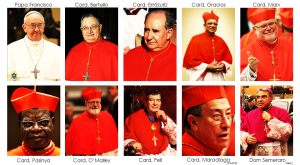 Meeting for the 5th time this week in Rome, the Council of Cardinals is working on matters of Church’s governance. On many minds is the forthcoming (in 2015) new apostolic constitution replacing the current constitution, Pastor Bonus, of John Paul II. On some level the work of the Council has been seen as a mere reshuffling of Vatican offices and improving apostolic effectiveness. Or, so we are led to believe. It may sound cynical, but look at the historical reality of the Roman curia and you’ll notice some discouraging facts. You can rearrange the deck chairs but if the deeper matters are not addressed, e.g., personal conversion, true discipleship, protection of the marginalized (children, elderly, ill) then whatever materializes is meaningless. Christ asks for more than mediocre plotting and planning; the Church requires more in order to proclaim the Good News of Salvation in Christ Jesus.
Meeting for the 5th time this week in Rome, the Council of Cardinals is working on matters of Church’s governance. On many minds is the forthcoming (in 2015) new apostolic constitution replacing the current constitution, Pastor Bonus, of John Paul II. On some level the work of the Council has been seen as a mere reshuffling of Vatican offices and improving apostolic effectiveness. Or, so we are led to believe. It may sound cynical, but look at the historical reality of the Roman curia and you’ll notice some discouraging facts. You can rearrange the deck chairs but if the deeper matters are not addressed, e.g., personal conversion, true discipleship, protection of the marginalized (children, elderly, ill) then whatever materializes is meaningless. Christ asks for more than mediocre plotting and planning; the Church requires more in order to proclaim the Good News of Salvation in Christ Jesus.
As you know, the Council of Cardinals has been known as the C8 but is now to referred to as the “C9” because of the Secretary of State Pietro Cardinal Parolin has become a key interlocutor. Jesuit Father Lombardi stated: “While before it was referred to as the C8 plus one, I can now confirm it has now become the C9 because the Secretary of State Pietro Cardinal Parolin is “systematically taking part” in the discussions held by the Council of Cardinals and is a full member.
The addition of Cardinal Parolin to the Council will be made official when the pope issues his decision in a document. Regrettable, in my opinion, is the fact that heretofore NO member of Eastern Christianity is represented on the Council. The Catholic Church is a communion of churches and the Eastern Churches are constituent. One would think with the friendship Pope Francis shares with members of the Eastern Churches there would be a Patriarch on the Council. We ought to have a C10!
It comes to mind that that there ought to be an equivalent council to the C9 made of laity. There are analogues for this idea in Eastern Christianity. Ecclesial life, not debate on dogma and liturgical praxis, needs the Pope’s consultation with laity. While the Pontifical Council for the Laity does real good work, something broader is needed.
An announcement on changes in the Pope’s curia will be made next Wednesday that will affect, in particular, the Secretariat for the Economy and Institute of Works of Religion (IOR), AKA the Vatican Bank.
The C9 will meet 15 to 17 September, 9 to 11 December and 9 to 11 February.
Common Declaration of Pope Francis and Patriarch Bartholomew
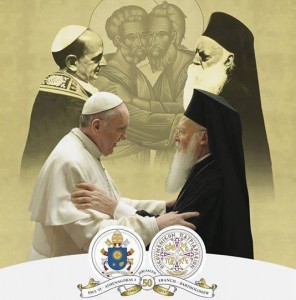 Pope Francis and the Ecumenical Patriarch, Bartholomew I, on Sunday held private talks in Jerusalem and signed a Common Declaration in which they pledged to continue on the path towards unity between the Catholic and Orthodox Churches. Their encounter marked the 50th anniversary of the historic meeting between Pope Paul VI and the Patriarch Athenagoras in 1964. In their joint declaration, Pope Francis and Patriarch Bartholomew said it is their duty to work together to protect human dignity and the family and build a just and humane society in which nobody feels excluded. They also stressed the need to safeguard God’s creation and the right of religious freedom. The two leaders expressed concern over the situation facing Christians amidst the conflicts of the Middle East and spoke of the urgency of the hour that compels them to seek the reconciliation and unity of the human family whilst fully respecting legitimate differences.
Pope Francis and the Ecumenical Patriarch, Bartholomew I, on Sunday held private talks in Jerusalem and signed a Common Declaration in which they pledged to continue on the path towards unity between the Catholic and Orthodox Churches. Their encounter marked the 50th anniversary of the historic meeting between Pope Paul VI and the Patriarch Athenagoras in 1964. In their joint declaration, Pope Francis and Patriarch Bartholomew said it is their duty to work together to protect human dignity and the family and build a just and humane society in which nobody feels excluded. They also stressed the need to safeguard God’s creation and the right of religious freedom. The two leaders expressed concern over the situation facing Christians amidst the conflicts of the Middle East and spoke of the urgency of the hour that compels them to seek the reconciliation and unity of the human family whilst fully respecting legitimate differences.
Please find below the full text in English of the Common Declaration of Pope Francis and the Ecumenical Patriarch Bartholomew I:
1. Like our venerable predecessors Pope Paul VI and Ecumenical Patriarch Athenagoras who met here in Jerusalem fifty years ago, we too, Pope Francis and Ecumenical Patriarch Bartholomew, were determined to meet in the Holy Land “where our common Redeemer, Christ our Lord, lived, taught, died, rose again, and ascended into Heaven, whence he sent the Holy Spirit on the infant Church” (Common communiqué of Pope Paul VI and Patriarch Athenagoras, published after their meeting of 6 January 1964). Our meeting, another encounter of the Bishops of the Churches of Rome and Constantinople founded respectively by the two Brothers the Apostles Peter and Andrew, is a source of profound spiritual joy for us. It presents a providential occasion to reflect on the depth and the authenticity of our existing bonds, themselves the fruit of a grace-filled journey on which the Lord has guided us since that blessed day of fifty years ago.
2. Our fraternal encounter today is a new and necessary step on the journey towards the unity to which only the Holy Spirit can lead us, that of communion in legitimate diversity. We call to mind with profound gratitude the steps that the Lord has already enabled us to undertake. The embrace exchanged between Pope Paul VI and Patriarch Athenagoras here in Jerusalem, after many centuries of silence, paved the way for a momentous gesture, the removal from the memory and from the midst of the Church of the acts of mutual excommunication in 1054. This was followed by an exchange of visits between the respective Sees of Rome and Constantinople, by regular correspondence and, later, by the decision announced by Pope John Paul II and Patriarch Dimitrios, of blessed memory both, to initiate a theological dialogue of truth between Catholics and Orthodox. Over these years, God, the source of all peace and love, has taught us to regard one another as members of the same Christian family, under one Lord and Saviour, Jesus Christ, and to love one another, so that we may confess our faith in the same Gospel of Christ, as received by the Apostles and expressed and transmitted to us by the Ecumenical Councils and the Church Fathers. While fully aware of not having reached the goal of full communion, today we confirm our commitment to continue walking together towards the unity for which Christ our Lord prayed to the Father so “that all may be one” (Jn 17:21).
3. Well aware that unity is manifested in love of God and love of neighbour, we look forward in eager anticipation to the day in which we will finally partake together in the Eucharistic banquet. As Christians, we are called to prepare to receive this gift of Eucharistic communion, according to the teaching of Saint Irenaeus of Lyon (Against Heresies, IV,18,5, PG 7,1028), through the confession of the one faith, persevering prayer, inner conversion, renewal of life and fraternal dialogue. By achieving this hoped for goal, we will manifest to the world the love of God by which we are recognized as true disciples of Jesus Christ (cf. Jn 13:35).
4. To this end, the theological dialogue undertaken by the Joint International Commission offers a fundamental contribution to the search for full communion among Catholics and Orthodox. Throughout the subsequent times of Popes John Paul II and Benedict the XVI, and Patriarch Dimitrios, the progress of our theological encounters has been substantial. Today we express heartfelt appreciation for the achievements to date, as well as for the current endeavours. This is no mere theoretical exercise, but an exercise in truth and love that demands an ever deeper knowledge of each other’s traditions in order to understand them and to learn from them. Thus we affirm once again that the theological dialogue does not seek a theological lowest common denominator on which to reach a compromise, but is rather about deepening one’s grasp of the whole truth that Christ has given to his Church, a truth that we never cease to understand better as we follow the Holy Spirit’s promptings. Hence, we affirm together that our faithfulness to the Lord demands fraternal encounter and true dialogue. Such a common pursuit does not lead us away from the truth; rather, through an exchange of gifts, through the guidance of the Holy Spirit, it will lead us into all truth (cf. Jn 16:13).
5. Yet even as we make this journey towards full communion we already have the duty to offer common witness to the love of God for all people by working together in the service of humanity, especially in defending the dignity of the human person at every stage of life and the sanctity of family based on marriage, in promoting peace and the common good, and in responding to the suffering that continues to afflict our world. We acknowledge that hunger, poverty, illiteracy, the inequitable distribution of resources must constantly be addressed. It is our duty to seek to build together a just and humane society in which no-one feels excluded or emarginated.
6. It is our profound conviction that the future of the human family depends also on how we safeguard – both prudently and compassionately, with justice and fairness – the gift of creation that our Creator has entrusted to us. Therefore, we acknowledge in repentance the wrongful mistreatment of our planet, which is tantamount to sin before the eyes of God. We reaffirm our responsibility and obligation to foster a sense of humility and moderation so that all may feel the need to respect creation and to safeguard it with care. Together, we pledge our commitment to raising awareness about the stewardship of creation; we appeal to all people of goodwill to consider ways of living less wastefully and more frugally, manifesting less greed and more generosity for the protection of God’s world and the benefit of His people.
7. There is likewise an urgent need for effective and committed cooperation of Christians in order to safeguard everywhere the right to express publicly one’s faith and to be treated fairly when promoting that which Christianity continues to offer to contemporary society and culture. In this regard, we invite all Christians to promote an authentic dialogue with Judaism, Islam and other religious traditions. Indifference and mutual ignorance can only lead to mistrust and unfortunately even conflict.
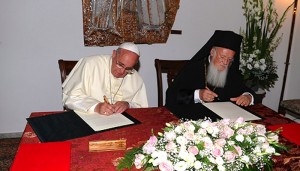 8. From this holy city of Jerusalem, we express our shared profound concern for the situation of Christians in the Middle East and for their right to remain full citizens of their homelands. In trust we turn to the almighty and merciful God in a prayer for peace in the Holy Land and in the Middle East in general. We especially pray for the Churches in Egypt, Syria, and Iraq, which have suffered most grievously due to recent events. We encourage all parties regardless of their religious convictions to continue to work for reconciliation and for the just recognition of peoples’ rights. We are persuaded that it is not arms, but dialogue, pardon and reconciliation that are the only possible means to achieve peace.
8. From this holy city of Jerusalem, we express our shared profound concern for the situation of Christians in the Middle East and for their right to remain full citizens of their homelands. In trust we turn to the almighty and merciful God in a prayer for peace in the Holy Land and in the Middle East in general. We especially pray for the Churches in Egypt, Syria, and Iraq, which have suffered most grievously due to recent events. We encourage all parties regardless of their religious convictions to continue to work for reconciliation and for the just recognition of peoples’ rights. We are persuaded that it is not arms, but dialogue, pardon and reconciliation that are the only possible means to achieve peace.
9. In an historical context marked by violence, indifference and egoism, many men and women today feel that they have lost their bearings. It is precisely through our common witness to the good news of the Gospel that we may be able to help the people of our time to rediscover the way that leads to truth, justice and peace. United in our intentions, and recalling the example, fifty years ago here in Jerusalem, of Pope Paul VI and Patriarch Athenagoras, we call upon all Christians, together with believers of every religious tradition and all people of good will, to recognize the urgency of the hour that compels us to seek the reconciliation and unity of the human family, while fully respecting legitimate differences, for the good of all humanity and of future generations.
10. In undertaking this shared pilgrimage to the site where our one same Lord Jesus Christ was crucified, buried and rose again, we humbly commend to the intercession of the Most Holy and Ever Virgin Mary our future steps on the path towards the fullness of unity, entrusting to God’s infinite love the entire human family.
“May the Lord let his face shine upon you, and be gracious to you! The Lord look upon you kindly and give you peace!” (Num 6:25-26).
Jerusalem, 25 May 2014
The primate of Canada gets it!
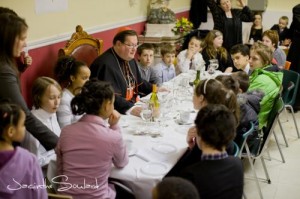 A friend mine sent me this photo of the Archbishop of Quebec, primate of Canada and cardinal of the Roman Church, Gérald Cyprien Lacroix, I.S.P.X., … at a parish function, and who is he sitting with? This is awesome; a prelate who gets it. And, of course it being Quebec, wine on the table with kids!
A friend mine sent me this photo of the Archbishop of Quebec, primate of Canada and cardinal of the Roman Church, Gérald Cyprien Lacroix, I.S.P.X., … at a parish function, and who is he sitting with? This is awesome; a prelate who gets it. And, of course it being Quebec, wine on the table with kids!QEII meets Francis
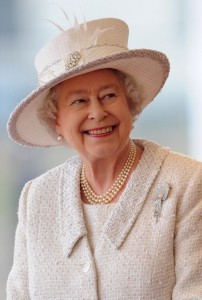 Queen Elizabeth II, 87, with Prince Philip, 92 is today in Rome fulfilling an invitation she had to reschedule in 2013 due to ill health. Last year the Queen was to meet Italy’s President Giorgio Napolitano. Her one day visit to Rome brings her to a private lunch at the presidential Quirinale Palace with the Italian President and then to have tea with Pope Francis.
Queen Elizabeth II, 87, with Prince Philip, 92 is today in Rome fulfilling an invitation she had to reschedule in 2013 due to ill health. Last year the Queen was to meet Italy’s President Giorgio Napolitano. Her one day visit to Rome brings her to a private lunch at the presidential Quirinale Palace with the Italian President and then to have tea with Pope Francis.
Loris Capovilla becomes cardinal of the Roman Church
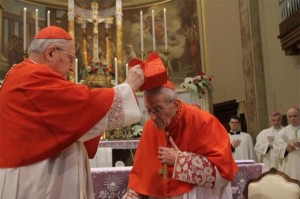 The Holy Father created 98 year old Archbishop Loris Francesco Capovilla a Cardinal of the Holy Roman Church. Because of age Capovilla did not go to Rome to receive the cardinal’s rad biretta and ring, so the Dean of the College of Cardinals, Angelo Cardinal Sodano, went to him to bestow the honor in Sotto il Monte. This town is the area where Angelo Roncalli was born. Cardinal Capovilla received as his titular church Santa Maria in Travestere. The former cardinal titular of Santa Maria is Jozef Glemp of Warsaw who died in January 2013.
The Holy Father created 98 year old Archbishop Loris Francesco Capovilla a Cardinal of the Holy Roman Church. Because of age Capovilla did not go to Rome to receive the cardinal’s rad biretta and ring, so the Dean of the College of Cardinals, Angelo Cardinal Sodano, went to him to bestow the honor in Sotto il Monte. This town is the area where Angelo Roncalli was born. Cardinal Capovilla received as his titular church Santa Maria in Travestere. The former cardinal titular of Santa Maria is Jozef Glemp of Warsaw who died in January 2013.
His Eminence has been a priest for 74 years and a bishop for 47. He’s the former archbishop of Chieti and the former Prelate of Loreto.
The new cardinal was the distinguished secretary of Blessed John XXIII, to be canonized on 27 April 2014.
A brief video of the ceremony is here.
Pope Francis writes to new cardinals
On the day in which your designation is made public to be part of the College of Cardinals, I wish to express to you a cordial greeting together with the assurance of my closeness and my prayer. I hope that, as associate of the Church of Rome, clothed in the virtues and sentiments of the Lord Jesus (cf. Romans 13:14), you will be able to help me, with fraternal effectiveness, in my service to the universal Church.
The Cardinalate does not signify a promotion, or an honor, or a decoration. It is simply a service that calls for enlarging one’s vision and widening one’s heart. And, although it seems a paradox, this ability to look far ahead and to love more universally with greater intensity can only be acquired by following the same way of the Lord: the way of abasement and humility, taking the form of a servant (cf. Philippians 2;5-8). Therefore, I ask you, please, to receive this designation with a simple and humble heart. And, although you must do so with joy and gladness, do it in such a way that this sentiment is far from any expression of worldliness, from any celebration that is foreign to the evangelical spirit of austerity, sobriety and poverty.
Farewell, then, until next February 20, in which we will begin two days of reflection on the family. I remain at your disposition and, please, I ask you to pray and to have others pray for me.
May Jesus bless you and the Holy Virgin protect you.
Fraternally,
FRANCIS
From the Vatican
January 12, 2014
Wow! What a letter to read! Imagine receiving such a letter if you were nominated to the cardinalate in the Catholic Church. The papal letter is brief, direct, and an unexpected fraternal gesture expressing clear hopes (expectations?) for the men entering into the College of Cardinals. I hope not only the cardinals listen to what the Holy Father has to say, but the rest of us, too. What is said to the new cardinals is said to all the faithful!
Symbolic of the new form service for Christ and the Church is the adoption of the color red, expressed most often as “the red hat” (seen above) and the reception of a new ring. These are classic signs to the deeper reality of love and service. The wearing of the color red, the donning of the biretta (hat) and the wearing of the cardinal’s ring is a clear sign of willing to die for the Church, and to be of service to the Church at all costs. You might say that being a cardinal is all-consuming in all forms of service that others (deacon, priest, bishop & faithful lay person) may not have: the prayers for the new cardinal at the time of the consistory have a clear element of martyrdom in them. The martyrdom of a cardinal –which hasn’t happened in a while– ought to be a spark for new life in the Paschal Mystery.
One of the striking lines in the Pope’s letter is enlarging one’s vision and widening one’s heart. Other parts of the letter that we ought to note is how the cardinal relates to the person of the bishop of Rome: in a personalistic way. Moreover, Francis asks the new cardinals to celebrate with joy yet in a sober manner that is not triumphalistic keeping in mind what the Scriptures reveal.
